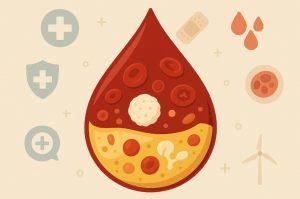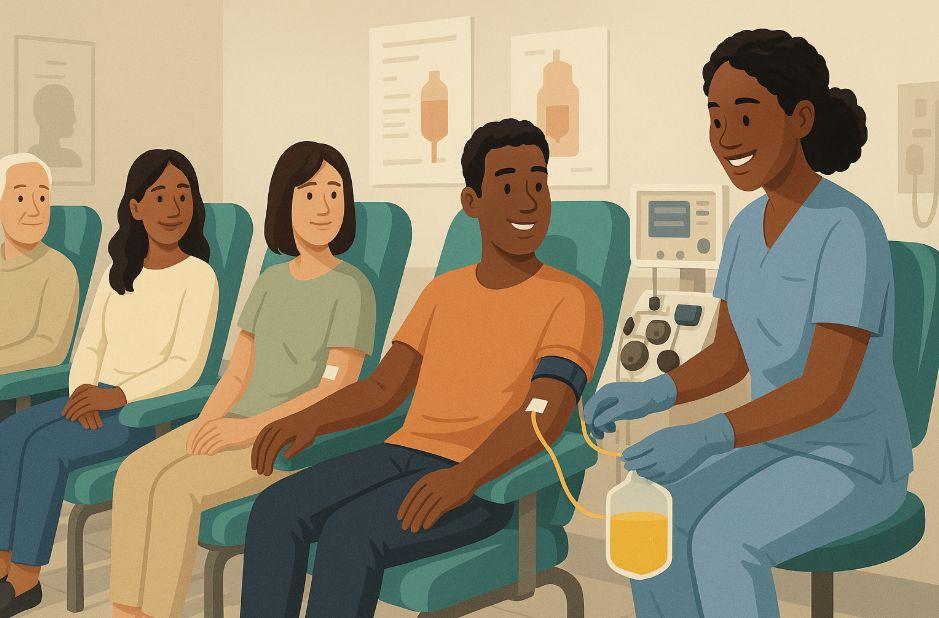In modern healthcare, blood plasma plays a critical role in saving lives. From treating severe trauma and burns to supporting patients with immune deficiencies and rare diseases, plasma derived therapies are essential.
Yet, demand consistently outpaces supply especially in major cities like London. Understanding the value of plasma donation and how individuals can contribute is key to addressing this urgent need.
Why Is Blood Plasma So Important?

Blood plasma, often referred to as the “liquid gold” of the human body, plays an essential role in medical treatments. It makes up over 50% of our blood and carries water, enzymes, hormones, and crucial proteins like albumin, clotting factors, and immunoglobulins.
These components are vital for treating trauma patients, individuals with bleeding disorders such as haemophilia, and those with immune system deficiencies.
In medical settings across the UK, particularly in NHS facilities, plasma is used in therapies that can be the difference between life and death. The importance of plasma became more widely recognised during the COVID-19 pandemic, when convalescent plasma was used experimentally to treat infected patients.
How Does the Blood Plasma Donation Process Work?
Plasma donation, also known as plasmapheresis, is a process where plasma is separated from blood and the remaining components red cells, white cells, and platelets are returned to the donor. The entire process typically lasts between 45 minutes to an hour, slightly longer than a standard whole blood donation.
Before donating, donors undergo a screening to ensure they are healthy and eligible. During donation, a needle is inserted into a vein, and the blood is drawn into an apheresis machine, which isolates the plasma. The rest of the blood is then returned through the same needle or a second one in the other arm.
The experience is generally painless, aside from the needle insertion, and most donors can resume normal activities shortly after.
Who Is Eligible to Donate Blood Plasma in the UK?
In the UK, the NHS sets clear guidelines for plasma donation eligibility. Donors must typically be between 17 and 65 years old, weigh at least 50kg, and be in generally good health. Individuals must also pass a pre-donation health check that includes questions about lifestyle, travel history, and medical background.
Those who have recently had surgeries, tattoos, or travelled to areas with high infection risk may be temporarily deferred. Regular medications or certain health conditions may also impact eligibility. Plasma donation is inclusive, but safety is prioritised for both donor and recipient.
How Is Donated Plasma Used to Treat Medical Conditions?

Once collected, plasma can be frozen and stored for up to a year, making it a valuable and flexible resource. It is used to create life-saving therapies for patients with chronic and acute conditions. For instance, people with primary immunodeficiency diseases rely on plasma-derived immunoglobulin infusions to live normal lives.
In trauma centres, plasma helps stabilise patients suffering from massive blood loss by supporting clotting. It is also crucial in the treatment of burns, liver diseases, and certain cancers. Some therapies involve creating plasma-derived medicinal products (PDMPs), which are distributed across hospitals and treatment centres throughout the UK.
What Are the Health Benefits and Risks of Donating Plasma?
For donors, giving plasma can be a rewarding experience. Not only are they helping save lives, but some studies suggest that regular donations may reduce harmful iron stores in the body and improve cholesterol levels. However, the primary motivation is often altruistic.
As with any medical procedure, there are risks though minimal. Some donors may experience fatigue, light-headedness, or bruising at the needle site. More rarely, citrate reactions (due to the anticoagulant used) may cause tingling or nausea. Donation centres in London and beyond follow stringent safety protocols to mitigate these risks and ensure donor comfort.
Where Can You Donate Blood Plasma in London?
London offers several donation centres operated by the NHS Blood and Transplant service. Key locations include centres in Tooting, Edgware, and West End Donor Centre. These centres are equipped with advanced apheresis machines and trained staff who guide donors through the process.
Appointments are usually necessary, and donors are encouraged to book online or via NHS Give Blood. Private clinics also offer donation services, though the NHS remains the primary avenue for voluntary plasma collection in the UK.
How Does Plasma Donation Differ from Whole Blood Donation?

Unlike whole blood donation, where all blood components are collected and separated later, plasma donation is more targeted. The apheresis machine separates plasma during the donation process and returns the remaining components, allowing donors to recover faster and donate more frequently every two to four weeks, compared to every 12 weeks for whole blood.
Additionally, plasma donation volumes are higher since only the liquid component is taken. This makes it more efficient for producing therapies but also requires a slightly longer commitment from the donor.
Can You Get Paid for Donating Plasma in the UK?
The UK follows a voluntary, unpaid donation model, particularly through the NHS. This aligns with World Health Organisation (WHO) guidelines that advocate for non-remunerated donation to ensure safety and ethical practice.
Unlike in some countries such as the US, where donors may receive compensation, plasma donation in the UK is driven by altruism. Donors do receive light refreshments and sometimes small tokens of appreciation, but monetary compensation is not provided. This approach ensures that people are donating for the right reasons saving lives.
How Often Can You Donate Blood Plasma Safely?
The body replaces plasma quickly usually within 48 hours which makes plasma donation a more frequent activity compared to donating whole blood. The NHS allows donors to give plasma every two to four weeks, depending on their health and how well they recover after donation.
Frequent donations are safe when proper hydration and rest are observed. Regular health checks also ensure that donors remain eligible and that donation continues to be safe and beneficial.
How Is the Demand for Blood Plasma Changing in the UK?

In recent years, the demand for plasma has grown steadily due to advancements in medical science and increasing diagnoses of rare immune conditions. The COVID-19 pandemic further exposed the UK’s reliance on plasma imports after domestic collection was paused for 20 years due to concerns over variant Creutzfeldt-Jakob disease (vCJD).
Since resuming collection in 2021, the NHS has focused on rebuilding domestic supply chains to meet local demand and reduce dependence on imported plasma. Awareness campaigns in London and other urban centres aim to attract new donors and ensure a stable plasma supply for future needs.
How Can You Prepare for a Successful Plasma Donation?
Preparation plays a crucial role in donor experience. Staying hydrated in the days leading up to the donation, eating a balanced meal before the appointment, and avoiding alcohol are all essential. Wearing comfortable clothing and bringing a valid ID helps streamline the process at donation centres.
Donors are also advised to relax and stay calm during the procedure. Listening to music or chatting with staff can help ease nerves. After the donation, a short rest and some refreshments help the body recover more efficiently.
Why Should More People in London Consider Donating Plasma?
London is home to some of the busiest hospitals and most diverse populations in the UK, meaning the demand for plasma-based treatments is especially high. By donating plasma, individuals contribute directly to the wellbeing of fellow Londoners and help alleviate pressure on the NHS.
One donation can help treat multiple patients and has the potential to save lives. As medical technology continues to evolve, plasma will remain at the forefront of personalised treatments and critical care solutions.
Raising awareness, improving education about the process, and debunking myths can significantly increase donation rates in the city. It’s not just a contribution. it’s a public service.
Conclusion
Donating blood plasma isn’t just a kind gesture. it’s a medical necessity. With increasing demand, especially in a global hub like London, more donors are needed to support critical care and specialised treatments.
Plasma donation is safe, regulated, and deeply impactful. For those who qualify, making this simple decision could mean giving someone else a second chance at life.
FAQs About Donating Blood Plasma
How long does a plasma donation session usually take?
A typical session lasts between 45 minutes to an hour, slightly longer than whole blood donation.
Can I donate plasma if I’ve recently recovered from an illness?
It depends on the illness. Minor colds may only require a short deferral, but serious infections may require a longer waiting period.
Are there any side effects after donating plasma?
Some donors may feel light-headed or tired, but most people recover quickly with rest and hydration.
What is the minimum time between plasma donations?
In the UK, plasma can be donated every two to four weeks, depending on health and NHS guidelines.
Is plasma donation safe during menstruation?
Yes, it is generally safe, though some women may feel more fatigued. It’s important to listen to your body.
Can vegetarians or vegans donate plasma?
Absolutely. As long as other health criteria are met, diet does not affect eligibility.
Is donated plasma tested before it’s used?
Yes, all donated plasma is thoroughly screened for infections and diseases before being used in medical treatments.









Leave feedback about this